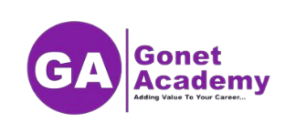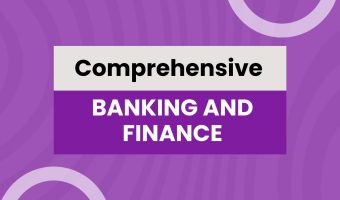Comprehensive Banking and Finance
About This Course
This 6-month Comprehensive Banking and Finance program builds technical knowledge and professional competence in the financial services industry. Participants gain essential banking operations skills, regulatory knowledge, financial analysis tools, and customer service acumen. It is aligned with the evolving needs of both traditional and digital banking institutions.
Learning Objectives
Understand the structure, functions, and types of financial institutions, including commercial banks, microfinance, fintech, and central banks.
Identify and apply core banking operations and services, such as deposits, withdrawals, loans, customer service, and account management.
Perform financial calculations, including interest, loan amortization, and time value of money using both manual and digital tools.
Evaluate credit applications and manage the credit lifecycle, from risk assessment to disbursement, monitoring, and recovery.
Carry out teller operations and cash management procedures, including cheque handling, fraud detection, and cash balancing.
Interpret and apply financial regulations, compliance guidelines, and ethical standards, including AML/CFT principles.
Record and analyze basic financial transactions, prepare reports, and interpret financial statements within a banking context.
Understand and adapt to digital banking systems, including mobile banking, ATMs, core banking software, and fintech innovations.
Identify and manage financial risks, apply internal controls, and support operational resilience in banking.
Design and present a banking or finance-related capstone project, integrating the full range of knowledge acquired.
Target Audience
- Aspiring bankers, customer service officers, loan officers, tellers, accountants, and professionals seeking to upgrade or transition into the banking and financial services sector
Curriculum
78h
Module 1: Introduction to Banking and Financial Systems
This foundational module introduces participants to the role of banks and financial institutions in the economy. It explores the history, types, and functions of banks, including central banking, monetary policy, microfinance, and fintech. Learners gain a macro understanding of how financial systems operate globally and in Liberia.
Topics Covered:
- History and Functions of Banking
- Types of Banks and Financial Institutions
- Central Banking and Monetary Policy
- Financial System in Liberia and Globally
- Fintech, Microfinance, and Mobile Money Ecosystems
- Introduction to Bank Regulations and Ethics
Module 2: Banking Products and Customer Services
Participants will learn about retail and corporate banking products such as savings accounts, loans, and credit facilities. The module emphasizes customer service skills, complaint resolution, KYC practices, and the importance of client satisfaction and retention in the banking industry.
Topics Covered:
- Deposit and Credit Products
- Retail vs Corporate Banking Services
- Loan Products and Account Types
- KYC and AML Basics
- Customer Service Standards in Banking
- Complaint Handling and Client Retention
Module 3: Financial Mathematics and Interest Calculations
This module strengthens participants’ financial literacy by teaching how to calculate interest, loan repayments, and discounted cash flows. Learners will apply concepts such as the time value of money and use practical tools like Excel and financial calculators to perform basic banking math.
Topics Covered:
- Simple and Compound Interest
- Loan Amortization and Installments
- Discounting and Present Value
- Time Value of Money
- Bank Charges and Commissions
- Use of Financial Calculators and Excel
Module 4: Credit and Loan Management
Participants will explore the full lifecycle of credit, from loan application to repayment. This module focuses on creditworthiness assessment, collateral management, underwriting procedures, credit risk evaluation, and managing non-performing loans (NPLs).
Topics Covered:
- Credit Analysis and Creditworthiness
- Collateral and Guarantor Management
- Loan Underwriting Process
- Credit Approval and Disbursement
- Monitoring and Collections
- Non-performing Loans (NPL) Management
Module 5: Teller Operations and Cash Management
This practical module trains students in front-line banking operations. It covers deposit-taking, withdrawals, cheque handling, cash balancing, fraud detection, and customer interaction etiquette. It prepares participants for teller roles in commercial and microfinance settings.
Topics Covered:
- Teller Duties and Cash Drawer Balancing
- Handling Deposits, Withdrawals, and Transfers
- Cheque Clearing and Payments
- Fraud Detection at Teller Counters
- Counterfeit Currency Identification
- Cashiering Etiquette and Safety
Module 6: Financial Institutions and Regulatory Compliance
Learners will examine the structure of the financial sector and the roles of regulatory bodies like the Central Bank of Liberia. The module addresses AML/CFT, prudential guidelines, Basel frameworks, compliance reporting, and ethics in banking.
Topics Covered:
- Role of the Central Bank
- Prudential Guidelines and Basel Accords
- Anti-Money Laundering (AML) and CFT
- Risk-Based Supervision
- Regulatory Reporting Obligations
- Compliance Audits and Ethics
Module 7: Accounting for Banks and Financial Reporting
This module provides essential accounting skills for the banking environment. Participants will learn to record transactions, reconcile accounts, and prepare basic financial statements. It also introduces IFRS guidelines and how banks assess financial health using key ratios.
Topics Covered:
- Chart of Accounts in Banking
- Recording Bank Transactions
- Trial Balance and Bank Reconciliation
- Preparation of Financial Statements
- IFRS Overview for Banks
- Key Financial Ratios and Reports
Module 8: Digital Banking and Financial Technologies
Participants explore the impact of technology on financial services. Topics include mobile banking, digital payments, core banking systems, cybersecurity, and fintech innovations such as blockchain and AI. This module prepares learners for digital transformation in finance.
Topics Covered:
- Digital Payment Systems
- Core Banking Software and MIS
- ATM, POS, Mobile & Online Banking
- Cybersecurity in Banking
- Fintech Disruptions and Opportunities
- Emerging Trends: Blockchain, AI in Finance
Module 9: Risk Management and Internal Controls
This module focuses on identifying, managing, and mitigating risks in banking operations. It covers credit, market, operational, and reputational risks, internal audit practices, fraud prevention, and the design of internal control systems.
Topics Covered:
- Enterprise Risk Management (ERM)
- Types of Banking Risks
- Internal Controls and Audit Functions
- Operational Risk and Business Continuity
- Fraud Risk Management
- Risk Monitoring Tools
Module 10: Capstone Project and Career Readiness
In the final module, participants synthesize their learning by completing a practical banking or finance project. They may design a financial product, simulate a bank branch operation, or propose a fintech startup. The module includes a presentation, peer review, and career guidance.
Topics Covered:
- Case Study: Banking Operations in Practice
- Design a Microfinance or Fintech Startup Model
- Final Exam or Portfolio Presentation
- Interview Prep and Career Coaching





